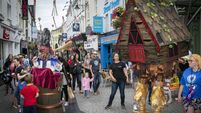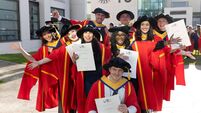Spitting Truth: Ancient Irish Poetry, Queer Joy, and the Art of Resistance in the Déise

Lora O'Brien MA.
There’s a long and fierce tradition in Ireland of speaking truth to power - not with fists, but with words sharp enough to cut stone.
In ancient times, our poets, known as filí, held high status not just because they were artists, but because they were respected, and even feared.
A trained poet could compose a verse that praised a person’s honour or, just as easily, dismantled it through sharp satire.
Their words carried weight, authority, and in some cases, the magical force to bless or curse.
One of the most powerful forms they used was called Rosc, a dense, rhythmic, often prophetic form of poetry that didn’t follow the usual metre.
It was the go-to style for moments of confrontation, divination, or declaration. In the old Irish myths, especially Cath Maige Tuired Second Battle of Moytura), an epic battle saga of the Tuatha Dé Danann, the Goddess Mórrígan uses Rosc to stir the land and summon power.
These aren’t gentle, lyrical verses. They’re raw, political, and emotionally charged. Rosc was (and still is) used to shake people awake. It is truth spoken with teeth.
Irish scholar Isolde Carmodywrote that Rosc poetry walks the line between prophecy and performance.
It appears in moments of deep social significance - just like a protest chant or a rousing speech today.
Carmody describes it as having “immediacy and intensity,” and it’s that very intensity that makes it so relevant to us now.
Because really, isn’t that what we’re doing when we celebrate Pride of the Déise? We gather, we shout, we sing and we perform - not just for entertainment, but to stake our claim in the public space.
We speak truths that still make some people uncomfortable. And we do it with joy. With style. With glitter, tunes, and a splash of irreverence. That’s our modern Rosc.
It’s not just on the parade route, either. One of the things that makes Pride of the Déise special is the way we lift up local artists, poets, comedians, filmmakers and performers.
These are the contemporary filí and satirists of the Déise - Queer creatives who reflect and challenge the world around us.
In their own ways, they’re carrying on the same work that ancient Irish poets and druids did a thousand years ago on this island. Naming injustice. Calling for change. Imagining something better.
And we’re not just talking about what goes on in Dublin or on the big stages.
Here in Waterford, we’ve seen some truly powerful art emerge from Queer creators - spoken word pieces that challenge shame culture, art installations that reclaim identity, short films that tell previously untold stories, and comedy sets that slice through societal expectations with a wink and a cackle.
These aren’t distractions from the “real” work of activism - they are the work. As Carmody notes, “Rosc is not composed for the page but for the moment.”
That’s exactly what our Queer art does best. We live in the moment - raw, urgent, unfiltered - and we make space for others to live there too.
Whether it’s a drag performance that challenges gender roles, a stand-up set that mocks homophobia, a poem or a song speaking truth to power, or a film that centres trans joy… these works of art resist silence. They create belonging. They show us all what’s possible.
Pride of the Déise honours that all year round. Through open mic nights, craft fairs, art exhibitions, film showings and local showcases, this organisation supports our creatives not just during Pride month, but throughout the year. We understand that resistance isn’t always loud. Sometimes it’s tender. Sometimes it’s hilarious. Sometimes it’s scrawled in biro on the back of a receipt. But it matters.
So this year, let’s honour the reality of our history and remember the old ways - but let’s celebrate the new ones too.
Let’s lift up the artists who speak for us, the poets who make us feel seen, and the moments of Queer joy that remind us who we are. Because in Waterford, resistance looks like community. It sounds like laughter. And it feels like home.






